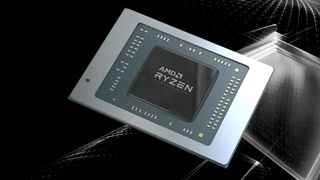We've been writing about Strix Halo for so long, without actually seeing any working hardware, that you'd be forgiven for believing that it's just vapourware. But with the first appearance of AMD's flagship laptop APU in the Geekbench database, we finally have some numbers to pore over. And a decidedly cumbersome name.
The moniker in question is the AMD Ryzen AI Max+ Pro 395 w/ Radeon 8060S, though the model's actual name doesn't have the Radeon part. But even so, saying 'I have a Ryzen AI Max+ Pro' before you even get to the specific version is hardly silky smooth marketing.
There's a good reason why desktop CPUs are just Ryzen 5 or Core i7, and this just feels like AMD's marketing division has been let loose with a box of crayons and a colouring book. I kid; it's clearly worked very hard to come up with the name.
Anyway, we already knew about AMD's clunky nomenclature and the name is ultimately irrelevant when compared to the fact that this is an APU with one heck of a CPU and GPU combination. Sporting two Zen 5 CCD chiplets for 16 cores, 32 threads, and 32 MB of L3 cache, the CPU side of things is going to be seriously potent. Not quite as good as a desktop equivalent, due to having half the amount of L3 cache (if the Geekbench info is correct), but still very nice indeed.
But it's the GPU that's the star of the show. RDNA 3.5 architecture, 40 compute units, and a 256-bit memory bus. That's not just massively better than any current laptop or handheld gaming PC APU—we're talking console-levels of performance here.
[GB6 GPU] Unknown CPUCPU: AMD RYZEN AI MAX+ PRO 395 8060S (16C 32T)Min/Max/Avg: 4757/5121/5087 MHzCodename: Strix HaloCPUID: B70F00 (AuthenticAMD)GPU: Radeonhttps://t.co/y5YK2wG2CPDecember 10, 2024
Well, potentially. We still don't know how well it'll run games, of course, but we now have a bit of insight into its compute performance, thanks to Geekbench (and BenchLeaks on X).
Someone has uploaded a score for the benchmark tool's Vulkan GPU compute test and the figure of 67,004 is not to be sniffed at. For example, this RTX 4060 laptop in the database achieved a score of 64,587 so purely based on my utterly unscientific sample of one, Strix Halo's GPU is better than an RTX 4060 (direct comparison).
Of course, that's a silly claim to be making, because one could spend a while browsing through the database (longer than necessary, given the lack of filters…) and eventually find an RTX 4060 result that's much better.
Geekbench doesn't show important values such as GPU clock speeds, power settings, or driver version. And it's purely a synthetic compute test, using Vulkan.
The computer's name in the Strix Halo result, "AMD MAPLE-STXH", strongly suggests that this is an engineering sample, so it's likely to be running with lower-than-retail clock speeds and a power setting that's aimed at stability, rather than performance.
One Geekbench result doesn't make for a mighty APU, no matter how good the score is, but I should imagine that this will be the start of a flood of entries, and over the coming weeks we'll get a better view of how Strix Halo is going to be.
The Ryzen AI Max+ Pro 395 is going to be very expensive but I can't wait to see just how good it is at gaming. Let's just hope that there's some monstrous performance to match that monster of a name.

 2 weeks ago
7
2 weeks ago
7









 English (US) ·
English (US) ·